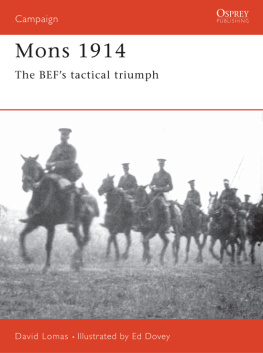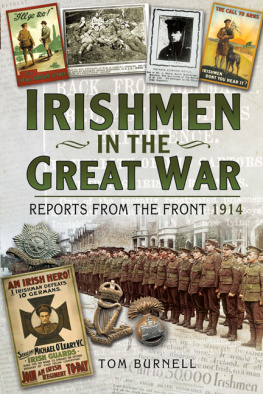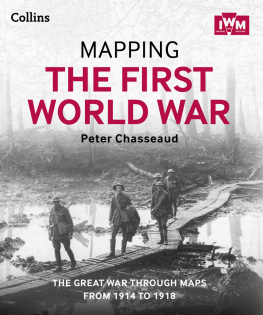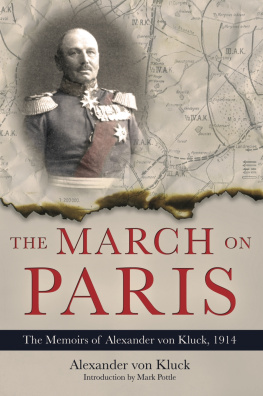ROUTLEDGE LIBRARY EDITIONS: THE FIRST WORLD WAR
Volume 4
GERMAN POLICY TOWARD NEUTRAL SPAIN, 19141918
GERMAN POLICY TOWARD NEUTRAL SPAIN, 19141918
RON M. CARDEN
First published in 1987
This edition first published in 2014
by Routledge
2 Park Square, Milton Park, Abingdon, Oxon, OX14 4RN
and by Routledge
711 Third Avenue, New York, NY 10017
Routledge is an imprint of the Taylor & Francis Group, an informa business
1987 Ron M. Carden
All rights reserved. No part of this book may be reprinted or reproduced or utilised in any form or by any electronic, mechanical, or other means, now known or hereafter invented, including photocopying and recording, or in any information storage or retrieval system, without permission in writing from the publishers.
Trademark notice: Product or corporate names may be trademarks or registered trademarks, and are used only for identification and explanation without intent to infringe.
British Library Cataloguing in Publication Data
A catalogue record for this book is available from the British Library
ISBN: 978-0-415-74924-4 (Set)
eISBN: 978-1-315-77961-4 (Set)
ISBN: 978-1-138-02444-1 (Volume 4)
eISBN: 978-1-315-77574-6 (Volume 4)
Publishers Note
The publisher has gone to great lengths to ensure the quality of this reprint but points out that some imperfections in the original copies may be apparent.
Disclaimer
The publisher has made every effort to trace copyright holders and would welcome correspondence from those they have been unable to trace.
M O D E R N E U R O P E A N H I S T O R Y
German Policy Toward Neutral Spain, 19141918
Ron M. Carden
Garland Publishing, Inc.
New York and London 1987
Copyright 1987 Ron M. Carden
All rights reserved
Library of Congress Cataloging-in-Publication Data
Carden, Ron M., 1942
German policy toward neutral Spain, 19141918.
(Modern European history)
Thesis (Ph. D.)University of New Mexico, 1979.
Bibliography: p.
1. World War, 19141918Diplomatic history. 2. GermanyForeign relationsSpain. 3. SpainForeign relationsGermany. 4. SpainNeutrality.
I. Title. II. Series.
D621.S7C37 1987 940.324430946 87-7436
ISBN 0-8240-8047-5
All volumes in this series are printed on acid-free, 250-year-life paper.
Printed in the United States of America
GERMAN POLICY TOWARD NEUTRAL SPAIN IN WORLD WAR I 19141918
BY
R. M. Carden
German Policy Toward Neutral Spain in World War I 19141918
R. M. Carden
B.A., History, Texas Tech University, 1965
M.A., History, New Mexico State University, 1967
Ph.D., History, The University of New Mexico, 1979
This paper presents a description and analysis of German diplomatic policy toward Spain during the First World War. In four stages, from August 1914 through October 1915, Berlin used adroit diplomacy and an effective propaganda network to encourage Spain to remain neutral. Conservative Spanish politicians, including King Alfonso XIII, feared that participation in the war would unsettle Spains domestic political structure and, therefore, wanted to remain outside of the maelstrom. Nevertheless, the King used the world crisis to further his aim of returning Spain to the status of a Great Power; Germany encouraged the Kings dreams.
The four stages of German-Spanish relations included a pro-German phase from August 1914 to September 1916, a time of tension in the fall of 1916 through April 1917, deteriorating relations over interned German submarines from May 1917 through March 1918, and finally sharp Spanish demands for indemnities for ships sunk by German submarines. Conciliatory diplomacy and constant use of German propaganda augmented Spanish forces that argued for strict neutrality, a policy that would benefit Germany.
In the interim, the Allies pressured Spain economically and diplomatically from September 1916 through March 1918 to abandon any hint of a pro-German attitude. Eventually, internal dissension and the need to remain within the British and French economic orbits caused Madrid to decide for a benevolent neutrality in favor of the Entente, Berlin, in the meantime, remained conciliatory, refusing to break relations, although the provocation in Madrid was severe.
Significantly, Spain, a leading European neutral, was not a direct participant in the war, and she was not completely favorable to the Allies until late in the struggle, German diplomatic subtlety and skill, an effective and farreaching propaganda network, and Spanish pragmatism all accounted for this result. In contrast to her relations with other major neutrals, Germany conducted a friendly policy toward Spain and avoided a break with Madrid.
Policy, German toward
Spain in World War I, 1914-1918.
Diplomatic histories of the First World War rarely deal with the difficulties of the small European neutral nations. Historians in the United States in particular have concentrated, understandably enough, upon the unique problems created by the neutrality of the U.S. government from 1914 through early 1917. Whatever attention that was paid to European neutrals resulted from by-products of studies relating to some aspect of American diplomacy. In the 1920s and 1930s, the Carnegie Endowment for International Peace commissioned works dealing with the wartime economic histories of Holland, Switzerland, Denmark, and Iceland, but Spain, physically large and strategically situated, was ignored.1 More recently, unpublished dissertations have examined specialized aspects of Spanish wartime policy vis--vis the United States or Spain and the European state system up to 1914.2 Clearly, little American study of Spanish relations with the European belligerents has been done.
European historians too have not investigated the wartime diplomatic relations between Spain and the Central European belligerents. The majority of the efforts that have been made stem, moreover, from the war or from the 1920s, when little extensive documentation was available.3 The leading European historian for Spanish foreign policy for the period of 1914-1918 was Albert Mousset, a major journalist in France, and during the war a member of the French Embassy in Madrid, While he was a prolific writer, his many articles and two major books on Spanish foreign policy did not reflect German and American archival material.4 Since the 1960s, some German and Austrian dissertations have concentrated upon certain aspects of Spanish relations with the Central Powers, utilizing German and Austrian archival sources, but these studies neglected almost all English language sources and several Spanish ones as well.5 The only Spanish treatments of Madrids policies during this period are contemporary accounts, books based upon slight documentary evidence, or specialized articles.6 Thus, European historians, including the Spanish, have not seriously delved into the story of Spanish relations with the Central Powers, especially Germany, the most significant member of the Triple Alliance.
Certainly, one cannot propose that German-Spanish relations during the war were the most important interrelations between a belligerent and a neutral, but there are ample justifications for examining German policy toward Spain and for discerning Spanish policy. The Iberian peninsula was strategically located, controlling the maritime approaches to the western Mediterranean and eastern Atlantic. Germany sought to use the many unguarded coves as refuges for her submarines. Spain also provided a listening post close to the enemy camp, making it possible to relay intelligence to Berlin. Also, Spain could function as a vital link with German diplomatic posts in the Western Hemisphere and in Asia. From the Allied side, Spain was important because of the extensive financial interests of French and British businessmen. The peninsula offered an excellent array of foodstuffs and military supplies for France and Great Britain. Spaniards could work in French factories, thereby freeing men for military service on the front. Both the Germans and the Western Powers, therefore, stretched every nerve to maintain Spanish neutrality in a sense favorable to their respective sides, and Madrid used the occasion to manipulate all belligerents to the benefit of Spain.












